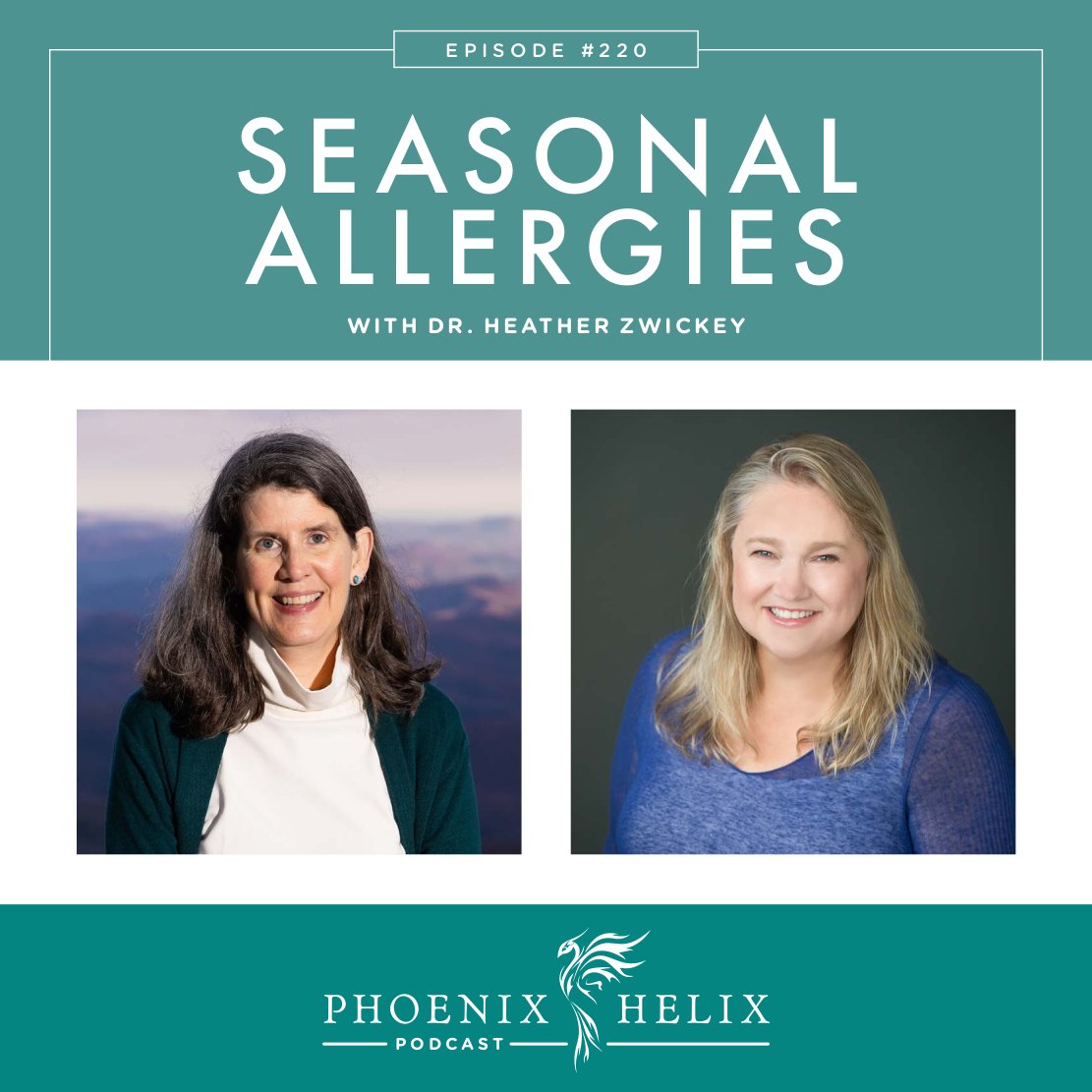How to Prevent and Relieve Seasonal Allergies
Spring is a visually beautiful season. The earth comes alive, the trees start to bud, and flowers pop up everywhere. After a hard winter, that can be lovely to see. But it’s hard to enjoy if that same season brings sneezes, runny nose, watery eyes, and other uncomfortable symptoms. And while this episode is airing in the Spring, seasonal allergies can happen anytime of year. What makes someone prone to seasonal allergies? Is autoimmune disease a risk factor? How can we build a resilient immune system that’s less susceptible to allergies? And what are some tips if we’re suffering right now? We’ll be answering these questions and more in today’s episode. My guest is Dr. Heather Zwickey, an integrative immunologist and microbiologist. She loves teaching about the intersection between nutrition, immunology, the gut microbiome, and the gut-brain-immune axis.
Listen to the Show
- Subscribe to my podcast through your favorite podcast app: iTunes, Stitcher, Google, TuneIn, Spotify, Amazon, etc.
- You can also listen to the episode right here through the player below, and if you subscribe to my newsletter you’ll get notified of future episodes.
Podcast: Play in new window | Download
Show Notes
- Intro (0:00)
- Thank You to Our Podcast Sponsor – Fully Healthy aka ShopAIP (2:44)
- FullyHealthy.com is the new home of ShopAIP, an online store dedicated to the Paleo Autoimmune Protocol. With hundreds of items for the elimination phase of the AIP, and products labeled by reintroduction category as well. You can find protein bars, sauces and condiments, AIP-friendly spices, cooking and baking ingredients, waffle and pancake mix, delicious snacks, and more.
- Today, I want to highlight a line of AIP-friendly condiment and sauces from KC Natural. When you’re in the elimination phase of the AIP, most traditional condiments are off the table. KC Natural was born to fill this need. They created AIP versions of barbecue sauce, teriyaki sauce, marinara sauce, salsa, ketchup, mustard, and ranch dressing! They’re absolutely delicious, and you can find all of these and more, at Fully Healthy.
- Use the code PHOENIX for 10% off your first order! Purchase here.
- Meet Dr. Heather Zwickey (4:04)
- Dr. Heather Zwickey has a Ph.D in Immunology and Microbiology. Over the past 20 years, she has led clinical research programs and graduate school programs focusing on immunology and natural and integrative medicine.
- When Our Immune System Gets Bored (5:33)
- The immune system is designed to protect the body from danger. Seasonal allergies became common in modern life when more dangerous infections were eliminated. For example, in countries where people have intestinal parasites, seasonal allergies don’t exist, but if the parasites are removed, allergies start to develop.
- When our immune system has less danger to fight off, it starts attacking things that aren’t dangerous (like pollen) and that manifests as seasonal allergies.
- Japan is the country with the least number of infections overall, and they have the highest incidence of allergic disease.
- Seasonal Pollen Triggers (8:22)
- While seasonal allergies can happen year-round, they’re most common at times when there’s a big pollen bloom. Spring allergies are usually caused by grass pollen, and fall allergies are usually caused by ragweed.
- Dust mites can also be a player in seasonal allergies. The mites poop on pollen, and when the pollen hits your nose, the feces is rehydrated. So, some people are actually allergic to the dust mite feces rather than the pollen itself, but the pollen is the carrier. Dust mites exist both inside and outside of houses.
- What Makes People Vulnerable to Seasonal Allergies? (10:24)
- No infections: Our immune system is designed to fight infections, and adults are expected to fight off 2-4 small infections per year. We’re not talking about serious infections like COVID, but rather mild colds and “bugs” where you recover quickly. This keeps your immune system in balance. If this isn’t happening, you’ll be more vulnerable to seasonal allergies.
- Too clean: In cultures where we live indoors rather than outdoors, keep our bodies and homes very clean, and use lots of hand sanitizer, we’re more prone to allergies.
- Imbalance in the microbiome: If our nutrition is poor or we’re exposed to too many chemicals, this leads to an imbalance in our microbiome which can also increase allergies.
- Hormone imbalance: Low estrogen levels in women make them more vulnerable to allergies. So, women who are menstruating may notice more allergy symptoms during the time in their cycle when their estrogen levels drop. Post-menopausal women have low estrogen levels throughout the month, which impacts the mast cell response and can make allergies more severe.
- Stress: During an allergic response, mast cells release histamine which causes the runny nose, watery eyes, hives, etc. Stress by itself can cause mast cells to auto-degranulate, releasing a histamine response, even when there is no environmental allergen present. This can happen in response to emotional stress or physical stress. Combined with seasonal allergies, stress makes symptoms worse.
- Climate change: Extreme temperatures can cause an allergic response, independent of pollen. Some people will get hives in response to severe heat or cold. Climate change is causing more temperature extremes. It’s also changing plant life. Species are now growing in places they never grew before, introducing people to pollen they weren’t exposed to before.
- Autoimmune Disease and Seasonal Allergies
- While infections help keep the immune system in balance and lower allergy risk in people who are healthy, infections can be risky for people with autoimmune disease because they can cause autoimmune flares. For this reason, people with autoimmune disease often take precautions to avoid infections, and this has the side effect of increasing vulnerability to allergies.
- Just as sex hormones influence the allergic response of the immune system, they also influence the autoimmune response. When estrogen levels are high in the bloodstream, autoimmune flares are more likely and when they are low, allergies are more likely. Testosterone also has an impact on the immune system and is being tested as an immunosuppressant in men. There’s less known about its impact on allergies. Balancing hormones overall helps keep the immune system in balance, minimizing both flares and allergies.
- Stress is something that increases the likelihood of both autoimmune flares and allergic responses.
- Since most of our immune system is located in the gut, imbalances in the gut microbiome can increase both autoimmune and allergy activity.
- Note: there’s no specific time stamp for this section because the autoimmune discussion was integrated throughout the interview.
- Thank You to Our Podcast Sponsor – Luminance Skincare (22:40)
- Today I want to highlight their bestselling facecare trio, which includes their Delicate Cleanser, Rosewater Toner, and Deep Hydration Moisturizer. Each one of these products has over 500 five-star reviews on their website. And they have a sample kit, so you can try it yourself! The Delicate Cleanser gently and deeply cleanses your skin without drying it out. The Rosewater Toner perfectly adjusts and balances the pH of your skin. The Deep Hydration Moisturizer mimics skin’s natural oils to soothe dry skin while maintaining a clear complexion.
- Whereas conventional skincare products are full of chemicals that can hurt our bodies, Luminance is made from ingredients that nourish. Their products are natural, organic, wildcrafted, non-GMO, and gluten-free (and they’re even made in a dedicated gluten-free facility). It’s the cleanest skincare anywhere! And everything is handmade in small batches within the United States.
- They have a complete face and body care line, including cleansers, toners, moisturizers, masks, acne serum, lip balms, haircare, sunscreen, handcrafted soaps, and more.
- Order their sample kit today, and once you fall in love and want to order full-size bottles, use the code HELIX for 10% off your order. (You can also use the HELIX coupon on any Luminance product, not just the facecare trio.)
- How to Build a Resilient Immune System (28:51)
- Spend time with animals. Pets can help stimulate the immune system in a safe way that can correct the overcleanliness of modern life. Dr. Zwickey recommends this for everyone, including people with autoimmune disease. Furry pets are the most beneficial, because they lick their fur, transferring microbes to their fur, and when you pet them you pick up the microbes. (If you’re allergic to cats, choose a different animal that doesn’t stimulate an allergy response.)
- Garden: this is another way to safely expose your body to beneficial microbes. They exist in the soil.
- Work on hormone balance: Hormone Health Podcast Series.
- Find ways to manage stress: Healing Mindset.
- Improve the health of your gut microbiome. The majority of the immune system is located in the gut and interacts regularly with our gut microbiome. The healthier our microbiome, the healthier our immune system. This means good nutrition including lots of plant foods that feed the gut bacteria, and also making sure we get enough vitamin A, D, selenium, zinc, and magnesium. (Podcasts: The Gut Microbiome and Gut Health Superfoods.)
- Local seasonal honey: When we consume pollen in a food, our immune system responds differently than when we inhale pollen through our nose. In food, we can develop a tolerance to the pollen, and this can lower the allergic reaction when it’s inhaled. Honey is a great food to add to your year-round diet, but it’s important that it comes from local beehives who pollinate local plant life.
- Allergy Herbs and Supplements (31:40)
- Quercetin is well-known for stabilizing mast cells so they are less likely to degranulate and release histamine. It can be taken year-round to prevent allergy responses. It’s not as helpful for symptom management once allergies are already present.
- Two herbs that can be taken year-round as prevention, but also are helpful for symptom management during allergy season are moringa and nettle.
- One more herb that’s helpful for symptom management is black cumin.
- Smelling essential oils can also provide symptom relief. Eucalyptus, peppermint, and lemon can open nasal passages. And frankincense and ravintsara can reduce swelling in the nasal passage.
- Note: when it comes to supplement experiments, consult with your healthcare team first to make sure there are no contraindications. And always try supplements one at a time, to make sure there’s no negative reaction. Everyone is unique in their response. If you find more than one supplement is helpful, you can layer them together during allergy season.
- Thank You to Our Podcast Sponsor – Captain Soup (38:49)
- Captain Soup sells nutrient-dense freezer meals, designed specifically to enable the body’s healing. They only use the highest quality ingredients including locally sourced, 100% grass-fed and finished meats, wild-caught seafood, 100% organic vegetables, and bone broth made in-house from the bones and organ meat from the best grass-fed lamb in the world.
- They sell 7 flavors of soup which are paleo, keto, and Wahls protocol-compliant. 5 of those flavors also fit the elimination phase of the Paleo Autoimmune Protocol. 4 of the flavors are Low-FODMAP. And 2 flavors are GAPS-compliant.
- Here are the flavors: Classic Lamb, Dijon Lamb, Italian Beef, Classic Beef, Dijon Beef, Green Machine & Tom Kha. (Tom Kha is a seafood soup that’s available in-season.) They also have the full ingredient list for every flavor on their website.
- You can buy pre-selected variety packs or build your own custom box. They also have a nutrient-dense liver pâté that can be substituted for any soup upon request.
- Order today and get nutrient density delivered to your doorstep! Use the code PHOENIX to save $25 off your first order.
- Other Tips for Managing Allergy Symptoms (40:31)
- Neti pot: this is a simple tool that rinses your nasal passages, removing the pollen. It can clear congestion and reduce allergy symptoms at the same time. Here’s a video tutorial demonstrating it’s use. It feels weird, but it does work! An alternative to the Neti pot is a bottle nasal irrigation system that’s designed to do the same thing.
- Humidifier: Humidity makes dust heavier so that dust (and dust mite feces) falls to the floor rather than floating in the air, and is less likely to be inhaled. This can be especially helpful in dry climates.
- Anti-Histamine Foods (43:39)
- Some examples of anti-histamine foods are onions, garlic, ginger, and turmeric. These help break down histamine. They’re also prebiotics that support a healthy gut microbiome. Resource: Anti-Histamine Foods List.
- Then it comes to turmeric, it’s active compound is called curcumin, and it has both anti-histamine and anti-inflammatory benefits. It can be taken as a supplement, but fraud is a problem. Choose a brand that’s been third-party tested for both potency and purity (free from heavy metals and other contaminants). Two high-quality brands are Pure Encapsulations and Integrative Therapeutics. Resource articles: Turmeric and Autoimmune Disease & Paleo AIP Turmeric Recipe Roundup.
- You can also avoid some high-histamine foods during allergy season to make yourself more comfortable, but be careful not to remove too many foods. We need nutrition to be healthy as well. Some of the highest histamine foods to avoid are alcohol, cheese, and processed meats.
- Probiotics (48:13)
- As a microbiologist, Dr. Zwickey doesn’t see probiotics as a uniform group. They are as diverse as pharmaceuticals, and every microbe has a different function. So, she doesn’t support the general recommendation to “take a probiotic” as if they’re all the same. Instead, she recommends people work with a practitioner who understands probiotics and can tailor a recommendation for you.
- That said, there are some strains that may help shift the immune system so that it’s less prone to allergies. These are lactobacillus strains (rhamnosus, plantarum, acidophilus, and GG). For autoimmune disease, bifidobacterium strains may be helpful in balancing the immune system (infantis, adolescentis, breve.) If you have both autoimmune disease and seasonal allergies, that’s more complex, and working with a practitioner is especially recommended.
- Resources:
- Probiotic Advisor is a website that shares research on probiotics specific to health conditions and outcomes.
- Custom Probiotics is a company that sells single strain formulas as well as multi-strain.
- Alternative Therapies (51:14)
- Acupuncture: This is Dr. Zwickey’s favorite alternative treatment, and she finds moxibustion as effective as needles. (Research summary.)
- Lymph Drainage: This is Eileen’s favorite alternative treatment. She used to be a professional lymphatic therapist. (Video tutorial.)
- Emotional Freedom Technique (EFT): This is another technique Eileen loves. (Video tutorial.)
- Allergy Medications (53:00)
- Anti-histamine medications do effectively stop mast cell degranulation and alleviate allergy symptoms. The downside is that they make people tired, and it’s dangerous to drive while taking antihistamines. If you’re going to take them, Dr. Zwickey recommends taking them in the evening before bed.
- The other downside is they are very difficult to go off once your body is accustomed to taking them. Wean yourself off slowly. Don’t try to stop cold turkey. Instead, drop to 1/2 tablet for a few days, then 1/4 tablet for a few days, before stopping completely.
- Non-Allergic Rhinitis (54:13)
- This is when you have seasonal allergy symptoms but anti-histamine supplements and medications are ineffective, and if you go to an allergy clinic you don’t test positive for pollen or other allergies. As we mentioned earlier in the interview, it is possible to have an allergic reaction to weather changes.
- In this case, the alternative therapies like acupuncture, lymph drainage, and EFT may be most helpful.
- Also, working on gut health supports immune system resilience overall.
- Outro (55:55)
- You can keep up with Dr. Heather Zwickey’s work through her website. On social media, follow her on Instagram.
- Eileen (your podcast host) is the author of multiple books, written to help people thrive with autoimmune disease. Learn more on the Books Page.
- If you like this podcast, follow or subscribe through your favorite podcast app. You can also subscribe to Eileen’s monthly newsletter.
- Check out the entire archive of podcast episodes.
You May Also Be Interested In
Spreading the Word
If you like the podcast, please leave a positive review in iTunes. It would mean the world to me, and also helps others find the podcast. Here are some quick instructions using your iPhone:
- If you are already subscribed to my podcast: (1) Click the purple podcast icon. (2) At the bottom of the screen, click Library. (3) At the top of the screen, click Shows. (4) Click the Phoenix Helix podcast image. (5) Scroll down the page, and you’ll see Ratings and Reviews. Scroll down a little bit more and click on Write a Review. This will bring up the review screen. Tap 5 stars (if you love the podcast), and then click in the title box, and it will bring up the keyboard. Enter a title and short review. (6) Click Send in the upper right corner. (7) Thank you! Positive reviews give the podcast a higher search ranking in iTunes, helping people find it and letting them know it’s a quality podcast and worth their time to listen.
- If you haven’t subscribed to my podcast: (1) Click the purple podcast icon. (2) In the lower right corner, click the magnifying class. (3) Type Phoenix Helix in the search box. (4) Click the podcast cover in the Show list. (5) If you’d like to subscribe, click the + sign at the top of the screen. (6) To write a review, scroll down the page, and you’ll see Ratings and Reviews. Scroll down a little bit more and click on Write a Review. This will bring up the review screen. Tap 5 stars (if you love the podcast), and then click in the title box, and it will bring up the keyboard. Enter a title and short review. (7) Click Send in the upper right corner. (8) Thank you! Positive reviews give the podcast a higher search ranking in iTunes, helping people find it and letting them know it’s a quality podcast and worth their time to listen.








